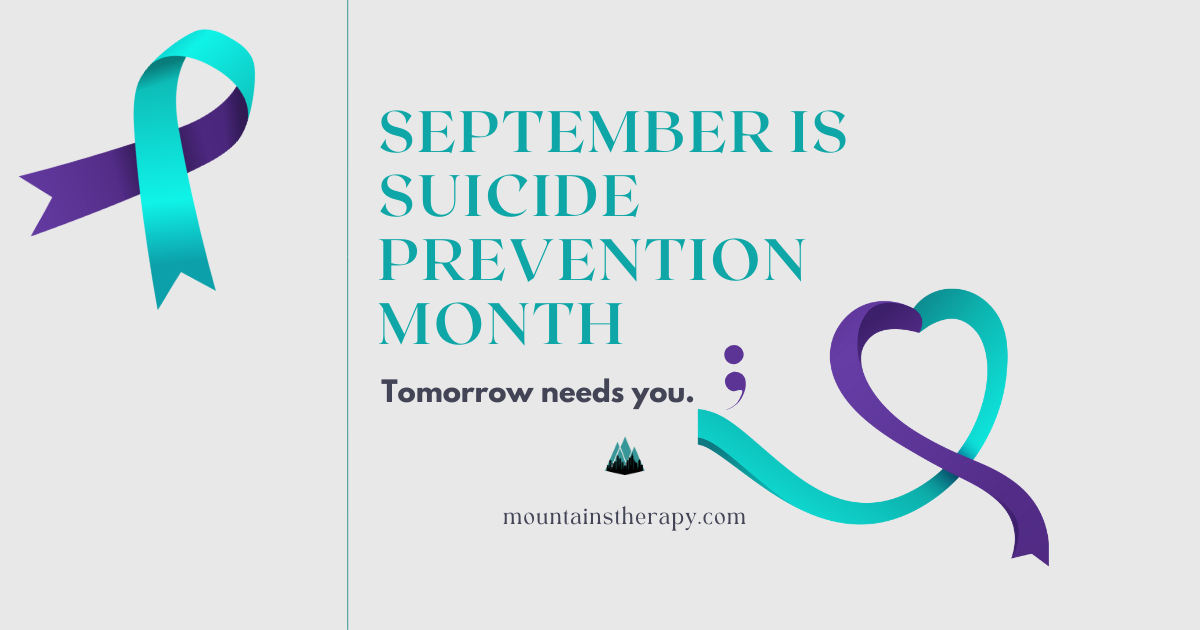Suicide Prevention Day: Saving Lives And Breaking The Silence
Learn more about Individual Therapy.
In This Blog, You’ll Learn
✅ What suicide prevention is and why it matters
✅ The warning signs of suicide and depression
✅ Key risk factors and protective factors against suicide
✅ Frameworks like the 3 C’s, 3 R’s, 4 P’s, and the 3ST model explained
✅ How therapy approaches like CBT, DBT, and ACT help in prevention
✅ Practical examples of how suicides can be prevented
Why Suicide Prevention Day Matters
Every year on
September 10th, the world observes Suicide Prevention Day to raise awareness, break stigma, and remind us that every life is worth saving. At
Mountains Therapy in Montclair, NJ, we believe that open conversations, support, and therapy can truly change outcomes for individuals who are struggling.
Understanding Suicide Prevention
What Is Suicide Prevention?
Suicide prevention refers to the strategies, support, and resources aimed at reducing suicide risk. It involves awareness, recognizing warning signs, addressing risk factors, and ensuring people know that help is available.
What Is the Biggest Prevention of Suicide?
Access to timely, compassionate mental health care. Therapy and open support systems are proven to lower risk.
How Are Most Suicides Prevented?
Most suicides are prevented through
- Early intervention
- Social connection
- Crisis support
- Consistent therapy
What Is Primary Prevention of Suicide?
Primary prevention focuses on stopping suicidal thoughts before they escalate through:
- Education
- Therapy
- Resilience-building
- Reducing stigma.
What Prevents People From Suicide?
- Strong family and community connections
- Access to professional mental health services
- Hope-building practices like Mindfulness-Based Therapy
- Removing access to lethal means
How Can We Prevent Suicides?
- Talk openly about mental health
- Check in with loved ones regularly
- Encourage therapy when someone struggles
- Call or Text 988 in the U.S. if someone is in immediate crisis to connect with the National Suicide Lifeline available 24/7.
Examples of Suicide Prevention
- Community awareness events like Suicide Prevention Day
- School-based mental health education
- Crisis hotlines and peer-support programs
- Access to therapy and long-term mental health treatment
Warning Signs and Symptoms
What Are the Warning Signs of Suicide?
Recognizing early signs can save lives.
🔴 Talking about wanting to die or feeling hopeless
🔴 Withdrawing from friends, family, or activities
🔴 Increased use of alcohol or drugs
🔴 Giving away possessions or saying goodbye
🔴 Extreme mood swings or changes in behavior
What Are Three Warning Signs of Depression and Suicide?
- Persistent sadness and hopelessness
- Social withdrawal and isolation
- Expressions of worthlessness or burdensomeness
What Are 5 Warning Signs of Depression?
- Changes in sleep or appetite
- Fatigue or low energy
- Trouble concentrating
- Loss of interest in enjoyable activities
- Thoughts of death or suicide
How Do You Know a Suicidal Person?
You may notice sudden withdrawal, hopeless statements, risky behaviors, or someone talking about feeling like a burden.
Risk Factors for Suicide
What Is the #1 Risk Factor for Suicide?
The strongest risk factor is a prior suicide attempt.
What Is the Strongest Indicator of Suicide Risk?
A past attempt remains the most reliable indicator that a person may attempt again.
What Are 5 Risk Factors for Suicide?
- Previous suicide attempt
- Untreated mental illness
- Substance misuse
- Trauma or abuse history
- Lack of social support
What Are the Top 3 Causes of Suicide?
- Untreated mental health conditions (depression, bipolar disorder, PTSD)
- Substance misuse
- Traumatic or overwhelming life stressors
Who Is Less Likely to Commit Suicide?
Research shows that people with strong social support, effective coping strategies, and access to therapy are less likely to attempt suicide.
Models and Frameworks
The 3 C’s of Suicide Prevention
- What Are the 3 C’s of Suicide Prevention?
The 3 C’s often used in prevention work are: - Care: Show genuine concern and empathy
- Connect: Link the person to supportive people and resources
- Communicate: Keep an open, nonjudgmental dialogue
- What Do the Three 3 C’s Stand For?
In crisis response, the 3 C’s also stand for: - Calm
- Clear
- Confident communication to reduce distress
- What Is the 3 C’s Technique?
A supportive approach focusing on: - Staying Calm
- Showing Care
- Making a Connection with someone who may be struggling
- What Are the 3 C’s of Crisis?
- Confidence in responding
- Control of emotions during crisis
- Compassion for the person in need
The 3 R’s of Suicide Prevention
- What Are the 3 R’s of Suicide Prevention?
- Recognize: Learn to identify the warning signs
- Respond: Offer immediate and compassionate support
- Refer: Connect the person to professional resources like therapy
The 4 P’s of Suicide Risk & Assessment
- What Are the 4 P’s of Suicide Risk & Assessment?
In clinical settings, therapists often assess: - Predisposing factors (trauma, family history)
- Precipitating factors (life stressors, breakups, loss)
- Perpetuating factors (ongoing mental health struggles)
- Protective factors (support systems, coping skills, therapy)
The 3ST Model of Suicide
- What Is the 3ST Model of Suicide?
The Three-Step Theory (3ST) explains suicidal ideation as: - Pain + hopelessness → suicidal thinking
- Connection → lowers risk
- Capacity for suicide → determines likelihood of attempt
How Therapy Helps With Suicide Prevention
At Mountains Therapy, our therapists provide compassionate, evidence-based care to address suicidal thoughts and underlying struggles. We use a variety of approaches, including:
- ACT – Acceptance Commitment Therapy for Suicide: Helps clients find meaning and commit to life-affirming values.
- Attachment-Based Therapy for Suicide: Strengthens bonds and reduces isolation.
- CBT – Cognitive Behavioral Therapy for Suicide: Identifies harmful thoughts and reshapes them.
- DBT – Dialectical Behavioral Therapy for Suicide: Builds distress tolerance and emotional regulation.
- EFT – Emotionally Focused Therapy for Suicide: Supports couples and families navigating crisis.
- Mindfulness-Based Therapy for Suicide: Grounds clients in the present to reduce despair.
- Narrative Therapy for Suicide: Helps rewrite painful stories with resilience and hope.
- Psychodynamic Therapy for Suicide: Explores unresolved conflicts and trauma.
- SFT – Solution Focused Therapy for Suicide: Builds step-by-step goals toward stability.
- TF-CBT – Trauma-Focused CBT for Suicide: Addresses trauma that contributes to suicidal ideation.
Start Therapy for Suicide Prevention Today
If you or someone you love is struggling, you are not alone. At Mountains Therapy in Montclair, NJ, we provide confidential, compassionate care to help you or your loved one find hope again. Together, we can break the silence, reduce stigma, and prevent suicide. To begin therapy, book your session online.














